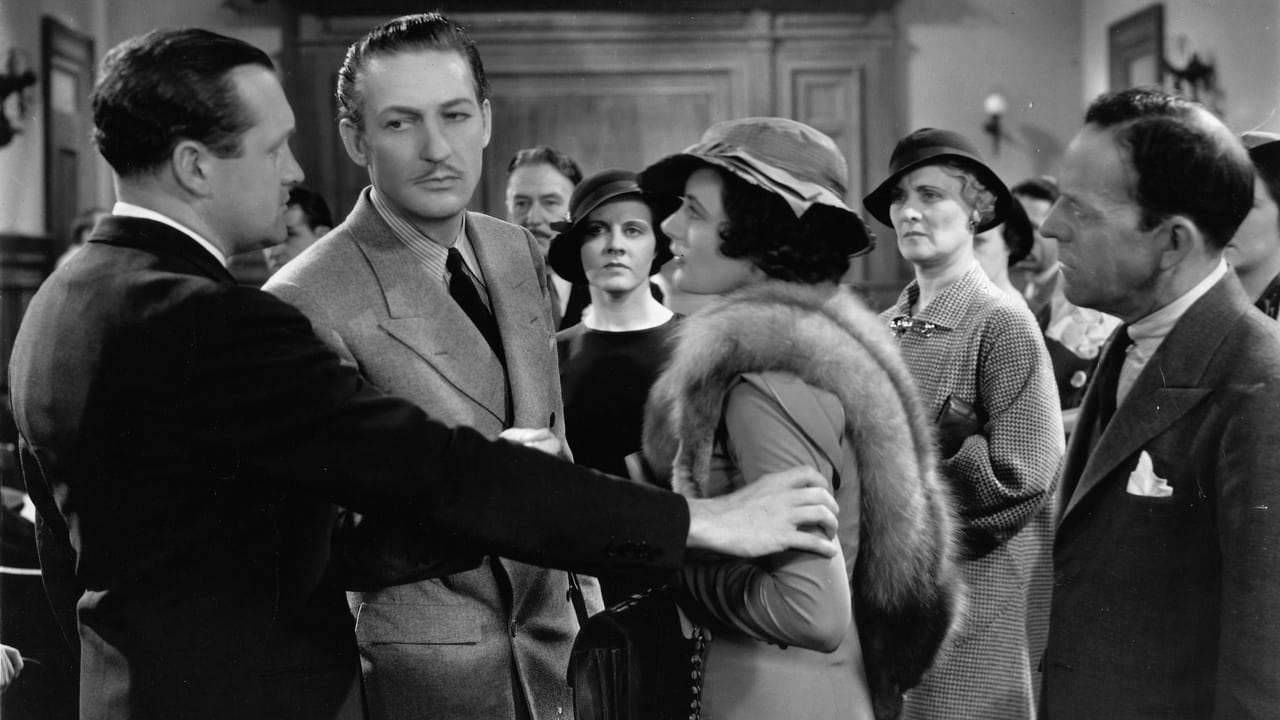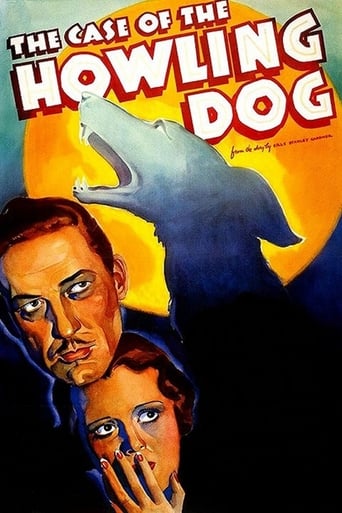

Good story, Not enough for a whole film
... View MoreIf the ambition is to provide two hours of instantly forgettable, popcorn-munching escapism, it succeeds.
... View MoreIt's a mild crowd pleaser for people who are exhausted by blockbusters.
... View MoreIt really made me laugh, but for some moments I was tearing up because I could relate so much.
... View MoreEarle Stanly Garden wrote his first Perry Mason book in 1933, and his fourth in 1934. The latter, "The Case of the Howling Dog," would become the first made into a movie. So, this film introduced the super lawyer- detective-sleuth to movie audiences. And, Warner Brothers couldn't have chosen a better lead than Warren William to play the part. William was cast in the first four Perry Mason movies, and all did very well. Only he among the cast remained constant. His secretary, Della Street, was the only other constant character in the first four films, but she was played by three different actresses. Gardner wrote 82 Perry Mason mystery novels in all from 1933 through 1969. The last two were published after his death. Two other early films were made in the mid- 1930s, with Ricardo Cortez and Donald Woods in the lead role. But those two were sufficient reason for Hollywood to take a break from Perry Mason films. That is, until author Gardner hooked up with NBC for the 1957-1966 TV series, "Perry Mason." Raymond Burr had risen slowly as an actor, but this role ensured his success for life. Besides the TV series, Burr was to star in the whole new batch of full-length films made for TV. From 1985 to 1993, NBC aired 26 Perry Mason movies that starred Burr, with a cast of regular characters from the TV series that seldom changed from film to film. The TV series and later movies had a completely different Mason. Not only in the character but in his routines. Most people today will remember the Mason played by Burr on TV and film. He was a clever attorney with the mind of a detective, who solved baffling cases usually with some brilliant discovery brought out in the courtroom. That is quite a different character than appeared in the first four films that starred Warren William. In those, Perry Mason had varying degrees of an office staff, with other attorneys and with his own detectives. But his character was humorous with any number of eccentricities. He drank too much, loved gourmet cooking and did some of that himself. And, knew his way around. He was as at home on the streets as he was in the courtroom. He would push the envelope at times and walk the thin line between legal and illegal methods. And, this Mason was as much or more a detective than he was a lawyer. These cases weren't solved in courtrooms but in other dramatic venues before they went to court. The scripts were excellent as well. Genuine humor dotted all the scenes. William carried this off beautifully without detracting from the seriousness of the crimes. But the entertainment in these early films was a splendid mix of humor, mystery, cleverness and wit of the leads and the many other characters. The exchanges between Mason and Street were always crisp and often very funny; and the various sidekicks were also adept at humor. While neither William nor Burr fit the persona of the Mason in the early novels, Gardner explained that he was evolving the character over time. He came to favor the dramatic courtroom scenes for exposing the solutions to the crimes. Thus, the Perry Mason that most people today remember from TV and the 1980s and on movies. The screenplays in the first four films were masterfully done to bring out the first Perry Mason character as played by William. Having watched the TV programs for years, and all of the later movies, I find these earlier films especially entertaining. "The Case of the Howling Dog" is the best of these four, but all are quite good. At one point in this film, Dellsa says to Perry: "You're a cross between a saint and a devil." Perry replies: "Mmm, hmm. How do you like it?"
... View MoreHaving seen one of Warren Williams' other Perry Mason films, I wasn't all that excited about seeing his first from the series, THE CASE OF THE HOWLING DOG. However, to my surprise, this film was exceptional for a B-detective film--with a very good plot, characters and acting. It was very different from the later "lady killer" Perry Mason films--and frankly, making Mason competent and not just a perv chasing skirts was a good idea.The film begins with a very convoluted encounter Mason has with a really bizarre client who is whining about some "barking dog". None of it makes much sense, even to Perry and the viewers are supposed to be confused. Later, however, all this actually makes a lot of sense. And in an interesting twist, Perry is very willing to help a woman beat a murder rap--even when she really is guilty! This isn't as bad as it sounds, as she has very good reason to kill the jerk! Warren William's character is more subtle and competent than in the later films. In later films, helping out clients is far less important than cooking and bedding women! A very good example of a well-made B movie.
... View More***SPOILERS*** "The Case of the Howling Dog" is the film that introduced legendary defense attorney Perry Mason, originated on the screen by Warren Williams,to millions of movie goers and some twenty years later, with Raymond Burr in the title role, TV watchers.Perry Mason, Warren Williams, is contacted by a nervous Arthur Cartwright, Gordon Westcott, claiming that his next door neighbor Clinton Foley's, Russell Hicks, German Shepard police dog Prince is driving him crazy. Prince has been howling his head off the last two nights causing Arthur to almost have a nervous breakdown. A bit taken back on what Arthur is telling him Perry is then asked to write out his will leaving everything Arthur has, and it's a lot, to Foley's wife Evelyn! It turns out that Evelyn is not exactly married to Clinton Foley she's only living with him as a mistress in his mansion.The story get's even more complicated when later both Arthur and Evelyn, who it turns out is actually Arthur's estranged wife, disappear from sight leaving Foley to suspect that they planned this all along from the start. Perry now stuck in representing Foley's actual wife Bessie, Mary Astor, whom he dumped for Evelyn Cartwright in that legally she's the woman whom's Arthur, through Perry being his lawyer, left his estate to.Were lead through a maze of subplots in not just the connection between Arthur and the Foley's, Clinton & Bessie, but their dog Prince who's the key to what is later to happen in the film. Bessie Foley is later on the scene at the Foley's mansion where her ex-husband Clinton and his dog are shot and killed by either Bessie or someone hiding inside the house. With Foley's housemaid and what turned out to be his lover Lucy Benton, Dorothy Tree, seen by one of Perry Mason's assistants private detective George Dobbs,James P. Brutis, running from the premises to an awaiting taxi it's assumed by everyone that she may well have shot and killed both Clinton and Prince. Telling Bessie to keep her mouth shut about her being on the scene of both Clinton Foley and Prince, a dog but a murder victim never the less, murders Perry is now committed in not only defending his client but possibly, in his defending her, covering up a crime: Murder. The really out of the blue surprise ending is what makes "Case of the Howling Dog" so ahead of it's time in that it doesn't tie all the loose ends together. The surprise ending does in a very intelligent and realistic way show that the law despite being written in granite is not at all perfect and that there are times when bending it, like Perry Mason does in the film, is really the best way to get justice done.P.S The movie "The Case of the Howling Dog" is such an excellent example of Amercan, or any other free and law abiding country, jurors prudence that it was remade some 25 years later in 1959 as a Parry Mason TV crime/drama episode. The story was so ahead of it's time in depicting the pitfalls and inconsistencies of the law that even then, 25 years later, it shocked the TV audience in it's totally out of the norm, for TV and the movies, surprise ending!
... View MoreThis is the first of the Perry Mason movies. Warren Williams brought the famous lawyer to life in much the same way that Raymond Burr would breath life into the Erle Stanley Gardner character for television in 1957. Surprisingly the first incarnation of Perry Mason is not that far from the later television creation. In the first movie as in the first television episodes Perry is a conniving shrewd barrister who not only bends the law but at times uses tricks that may actually be illegal. The Warren William incarnation would change with his next three films with Perry becoming a womanizing boozer. In "The Case of the Lucky Legs" Warren Williams' Mason has trouble staying sober long enough to do his job. After Warren Williams left the role, Ricardo Cortez and Donald Woods tried the part on for size and did fairly decent portrayals of the sharp-witted counselor. Television's Perry Mason also changed with time, but rather than going in the direction of playboy souse, being the McCarthy era, Raymond Burr's portrayal made Perry a scholarly type who won his case through sheer knowledge of the law and thorough investigation procedures.The first Perry Mason movie, "The Case of the Howling Dog," is possibly the best in the entire series. It was remade for television, turning out to be one of the best in the Raymond Burr series. Much of this is owed to the cleverness of the original book written by mystery writer Erle Stanly Gardner, but Warren Williams and later Raymond Burr should also be given credit for making the whole thing work.Warren Williams is ably assisted by a covey of fine actors and actresses including Mary Astor who would later make a permanent mark on movie history playing Brigid O'Shaughnessy in John Huston's classic "The Maltese Falcon." Della Street is there to aid Perry with a hint, as with the later TV series, of a romantic connection between the two. The character of Paul Drake does not appear but would appear in the next film, "The Case of the Curious Bride," as Spudsy Drake, played by the fine character actor Allen Jenkins, who plays Det. Sgt. Holcomb in the first film. Unlike William Hopper's TV Paul Drake, Spudsy is more of a comical sidekick for Perry, more in line with William Katt and William Moses' Paul Drake in the made for TV Raymond Burr Perry Mason movies. Also missing from the Warren Williams Perry Mason's are Hamilton Burger and Lt. Arthur Tragg. In their places we find Det. Sgt. Holcomb and District Attorney Claude Drumm, ably played by Grant Mitchell.The case this time is extremely complicated. The viewer has to follow the events concerning the Cartwright's and the Foley's very carefully, especially in the beginning. Talk about wife swapping! Gradually Perry and his associates are able to unravel the mystery but wait, there is a twist at the end that you don't want to miss just when you think the whole thing has been worked out and the guilty person exposed by Perry.Warren Williams not only plays Perry with gusto but adds much humor to the goings on. If you think Raymond Burr is the definitive Perry Mason, seeing this film may change your mind.
... View More